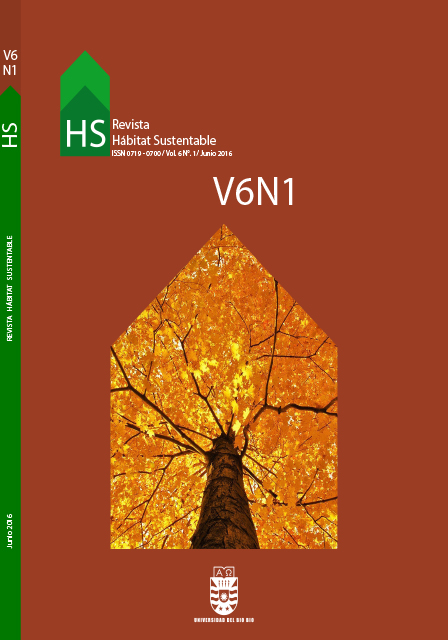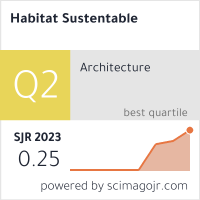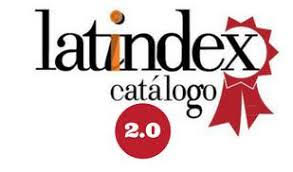A strategy for the incorporation of specific environmental, social and economic impacts into a Healthcare Building Sustainability Assessment (HBSA) method
DOI:
https://doi.org/10.22320/07190700.2016.06.01.04Keywords:
assessment methods, hospitals, HBSA method, sustainability, healthcare buildings, hospitals, sustainabilityAbstract
The design of a hospital environment involves many concerns related to the satisfaction and well-being of the medical personnel, patients, and administrators, and at the same time requires strong social responsibility and has a high impact on a city. Currently, it seems that the majority of this type of building is not designed or used in a sustainable way, although some tools have already been developed to support decision-making to optimize building sustainability. Based on this context, the aim of this article is to discuss the barriers to the dissemination of sustainable practices in healthcare buildings, and to propose the structure of a methodology that facilitates the incorporation of sustainability principles during the different life-cycle stages of a hospital building while overcoming some of the identified barriers. The structure presented is oriented to the Portuguese context and is based on the work done to date by the ISO and CEN organizations and other international sustainability assessment schemes already available on the market.
Downloads
References
ACSS. Recomendações e especi cações técnicas do Edifício Hospitalar. 2011. Lisboa: ACSS - Administração Central do Sistema de Saúde, 2012.
ACSS. Guia de boas práticas para o sector da saúde. 1.3 (2013). Lisbon: ACSS, 2013.
ACSS. Portal da Saúde [online], 2016. [Dta de consulta: 14 de maio 2016]. Disponível em: http://www.portaldasaude.pt/portal.
ASHE. Green healthcare construction guidance statement. Chicago: ASHE, 2002.
BAUM, Mara e SHEPLEY, Mardelle. Eco-Effective Design & Evidence- Based Design. Documento apresentado em: Cleanmed. Chicago, 2009, pp. 1–63.
BAUM, Mara; SHEPLEY, Mardelle; GINSBERG, Rachel e ROSTENBERG, Bill. Eco-Effective Design and Evidence-Based Design: Perceived Synergy and Con ic. HERD, 2009a, vol. 2, no. 3, pp. 56–70.
BAUM, Mara; SHEPLEY, Mardelle; ROSTENBERG, Bill e GINSBERG, Rachel. Eco-Effective Design and Evidence-Based Design: Removing Barriers to Integration. 1. San Francisco: AIA Board Knowledge Committee, 2009b.
CASTRO, Maria de Fátima; MATEUS, Ricardo e BRAGANÇA, Luís. Proposal for a Healthcare Building Sustainability Assessment (HBSA) Method. Em: World SB14 Barcelona. vol. 5. Barcelona: GBCe, 2014, pp. 607–613.
CASTRO, Maria de Fátima; MATEUS, Ricardo e BRAGANÇA, Luís. A critical analysis of building sustainability assessment methods for healthcare buildings. Environment, Development and Sustainability, 2015a, vol. 17, no. 6, pp. 1381–1412.
CASTRO, Maria de Fátima; MATEUS, Ricardo e BRAGANÇA, Luís. Estratégia para a incorporação de impactes ambientais, sociais e económicos especí cos num método de Avaliação da Sustentabilidade de Edifícios de Saúde (HBSA). Em: Latin American European Conference on Sustainable Buildings and Communities. EURO ELECS 2015, Guimarães, 2015b.
CASTRO, Maria de Fátima; MATEUS, Ricardo; BRAGANÇA, Luís e SERÔDIO, Francisco. Development of Benchmarks for Operating Costs and Resources Consumption to be Used in Healthcare Building Sustainability Assessment Methods. Sustainability, 2015, vol. 7, no. 10, pp. 13222–13248.
GUENTHER, Robin e VITTORI, Gail. Sustainable healthcare architecture. 1. Nova Jérsia: John Wiley & Sons, Inc., 2008.
GUENTHER, Robin e VITTORI, Gail. Sustainable healthcare architecture. 2. Nova Jérsia: John Wiley & Sons, Inc., 2013
HAMILTON, Kirk. Four Levels of Evidence-Based Practice. AIA Journal of Architecture. Nova Iorque: AIA, 2006, pp. 1–2.
ISO TS. ISO/AWI 21929, Building Construction – Sustainability in Building Construction – Sustainability Indicators - Part 1 - Framework for the development of indicators for buildings and core indicators. 2010. Geneva: ISO, 2010.
LEE, Wai-ling; CHAU, Chi-kwan; YIK, Francis; BURNETT, John e TSE, Man Sze. On the study of the credit-weighting scale in a building environmental assessment scheme. Building and Environment, 2002, vol. 37, no. 12, pp. 1385–1396.
MATEUS, Ricardo. Avaliação da Sustentabilidade da Construção. Guimarães: Escola de Engenharia da Universidade do Minho, 2009.
PENTLAND, William. Heal Thy Self: U.S. Hospitals Are Huge Energy Hogs. Forbes [online] [Data de consulta: 17 de outubro de 2013]. Disponível em: http://www.forbes.com/sites/ williampentland/2012/08/20/u-s-hospitals-are-huge-energy-hogs- better-light-bulbs-are-not-the-solution/.
ROBERTS, Greg e GUENTHER, Robin. Environmentally Responsible hospitals. Em: S. MARBERRY (ed.), Improving healthcare with better building design. 1. Chicago: Health Administration Press, 2006, pp. 81–107.
VAQUERO, Petra. Edifícios de saúde: Qual o caminho para a e ciência energética? Em: A. MALHEIRO (ed.), Tecno Hospital – revista de engenharia e gestão da saúde. vol. 58. Lisboa: EH ATEHP, 2013, pp. 18–20.
Downloads
Published
How to Cite
Issue
Section
License
Copyright (c) 2016 Hábitat Sustentable

This work is licensed under a Creative Commons Attribution-ShareAlike 4.0 International License.
The content of articles which are published in each edition of Habitat Sustentable, is the exclusive responsibility of the author(s) and does not necessarily represent the thinking or compromise the opinion of University of the Bio-Bio.
The author(s) conserve their copyright and guarantee to the journal, the right of first publication of their work. This will simultaneously be subject to the Creative Commons Recognition License CC BY-SA, which allows others to share-copy, transform or create new materials from this work for non-commercial purposes, as long as they recognize authorship and the first publication in this journal, and its new creations are under a license with the same terms.











 Scientific Information Program/Concurso Fondos de Publicación de Revistas Científicas 2018/ Proyecto Mejoramiento de Visibilidad de Revistas UBB (Código:FP180007).
Scientific Information Program/Concurso Fondos de Publicación de Revistas Científicas 2018/ Proyecto Mejoramiento de Visibilidad de Revistas UBB (Código:FP180007).





